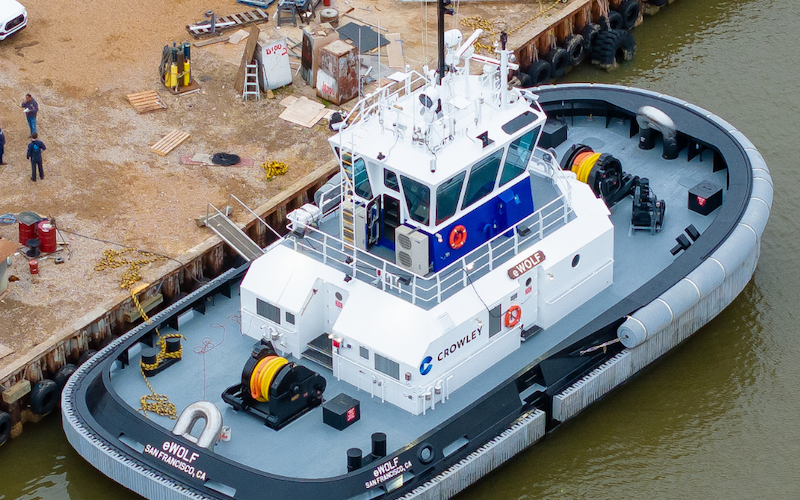Master Boat delivers first US all-electric ship assist tug
View Source
The 82' eWolf tug, which was designed by Crowley’s engineering services team, will operate with zero emissions while providing the complete performance capabilities of a traditional tug. Crowley photo
Master Boat Builders, Coden, Ala., has delivered the 82'x40'x17'9" eWolf, the first all-electric, ship assist harbor tugboat in the U.S., to Jacksonville, Fla.-based Crowley.
The eWolf was designed by Crowley’s engineering services team with a 16'5" draft. Itwill operate with zero emissions while providing the complete performance capabilities of a traditional tug.
Crowley said it is commited to improving air quality through battery energy for the vessel and port technology, including a shoreside, microgrid charging and storage station at the Port of San Diego.
The industry has been anticipating the new tug's delivery for over two years. During a visit to Master Boat in September, Garrett Rice, the shipyard’s president, explained that the delay was a result of the Coast Guard never having had to sign off on this kind of tug. There has never been a similar tug up for certification in the past. “Our industry has to be pushed to build toward innovation,” he said. “Our government doesn’t work fast.”
Main propulsion comes from 6.2-MWh battery power and two 2,100-kW electric motors spinning two azimuth thrusters. There are two switchboards — a DC grid and AC switchboard. For longer transits, the new tug has twin 300-kW generators. (Propulsion manufacturers' names were not provided by Crowley.)
The tug will have a running speed of 12 knots.
“The eWolf will provide services through its advanced vessel control technology and first-in-class energy features, while providing the safety, quality and reliability that Crowley and our mariners are known for,” James Fowler, senior vice president and general manager of Crowley Shipping, said in a statement. “We are thrilled to reach this important achievement for our company and the U.S. maritime industry through the collaboration with our partners.”
The tug will generate 178 less tons of nitrogen oxide (NOx), 2.5 tons less of diesel particulate matter and 3,100 metric tons less of carbon dioxide (CO2) over the first 10 years of its operations — the equivalent of removing 350,000 gals. of gas from use, according to EPA calculations. The vessel uses ABB’s integrated electrical propulsion system.
Keegan Plaskon, director of business development at the American Bureau of Shipping (ABS), said during a conference session at the recent International WorkBoat Show that the eWolf complies with U.S. shipping industry standards and will be the first Jones Act-compliant all-electric tug.
So, what is the future? Battery-driven electric motors cannot be retrofitted and placed in existing tugs, but alternative fuel engines can be retrofitted.
Master Boat's Rice said during the eWolf session that “it’s costly to retrofit an already existing vessel fully. Federal and state grants can help fund new fully electric vessels.”
On deck will be a Markey Machinery DEPC-48-50-hp electric render/recover winch.
“The eWolf demonstrates where the maritime industry can go, in terms of both innovation and sustainability, with solid partnerships between owners, designers, suppliers and shipyards,” said Rice. “We are proud to have partnered with Crowley in the construction of the eWolf and look forward to seeing her at work in San Diego very soon.”
The 200-grt eWolf has an estimated bollard pull of 70 short tons. Tankage includes 9,800 gals. of fuel and 750 gals. fresh water.
“We attract people to the marine industry with these new developments," Crowley Engineering’s Coulston Van Gundy, said during the WorkBoat Show panel session. "We must provide innovative, sustainable vessels for this industry to stay ahead for our customers and the next generation.”

